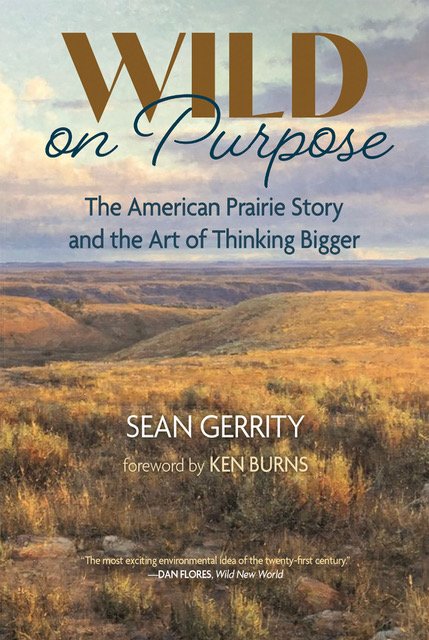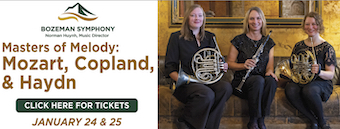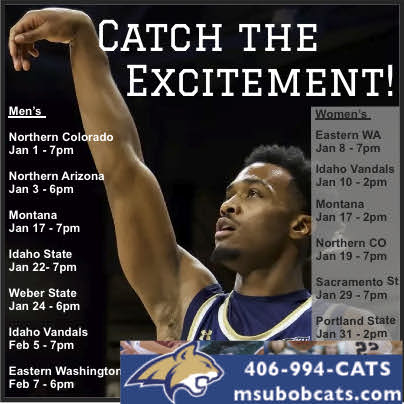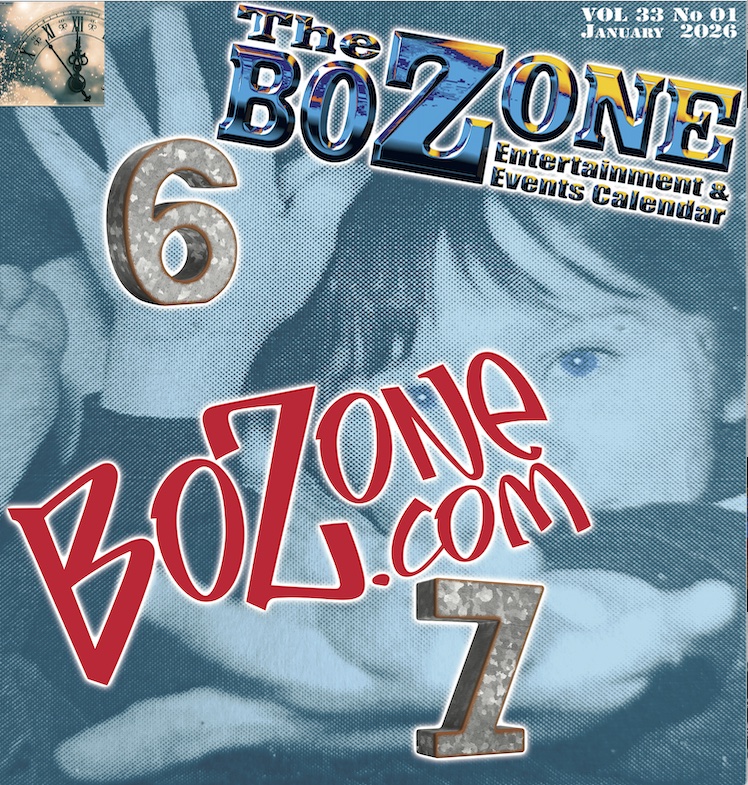Verge Theater amidst new season of quirky, thought-provoking & hilarious performances
In a space ordinarily reserved for fantastic local musicians and those visiting town, The Rolling Zone elected to highlight another of the “performing arts” in our community — theater! We sat down with Hilary Parker, Executive Director of Bozeman’s own Verge Theater, for a conversation about the upcoming season, interactive community theater, and the necessity of stage theatrics in contemporary times.
RZ: Verge kicked off its 23rd season with a crazy successful run of The Producers, signaling the return of yet another exciting slate of performances. Tales From The Verge with the theme of “Something New” is next up. Tell us a little bit about what to expect from this weekend of shows.
HP: First of all, we’re really grateful to the Bozeman community for coming out in such strong numbers [for The Producers]. With “Something New,” part of what Verge is doing is helping Bozeman keep its culture. We do that by sharing stories. Bozemanites and people in the Gallatin Valley are welcome to come and tell funny, strange, or interesting tales. That’s how Tales got started, and it’s been a fantastic way for people to communicate amongst each other. So much of our storytelling tradition is oral and is about passing on wisdom. We like that this is a piece of that — a piece of Bozeman’s greater storytelling tradition. Tales is always funny and always interesting. Those are especially fun for us to produce, and I think especially meaningful for the people who attend. 
RZ: The twice-monthly Improv on the Verge, hosted by the Bozeman Improverts, is also back for fall. For those unfamiliar, what is improv?
HP: Improv is more than just getting up on stage and being funny or clever. Improv is creating interesting and engaging scenes through collaboration and connection with the audience. There’s a formula to improv, but the basic rule is what we call “Yes, and…” You take an idea someone throws at you, whether audience member or improv team member on stage, and you roll with it. “Yes, and…” is a very positive way to look at life, and it helps people accept things that are happening and make them their own. In part that’s why we get such great responses from our kids and teens who come and take improv classes. “Yes, and…” is kind of a natural thing, as a kid, when we create and tell stories. As we age and maybe get a little more jaundiced in our view of the world, there’s a little bit of “No, but…” Improv reminds us of the power of our “Yes, and…” attitude. It’s an incredibly powerful and positive force in people’s lives.
RZ: We were also hoping for a little peek behind the curtain. Who are the Improverts, and why is this particular group of local thespians sure to draw laughs even though they go into each show without a script?
HP: The Improverts are a group of improvisers who got their start here at Verge Theater with the improv classes, and have been working together for four years. They’ve really grown together and have developed a show format that audiences love. They do hold rehearsals in which they work on how to communicate with one another. That doesn’t mean anything you see up on stage is staged, it means they’re always working on how to create funny and meaningful moments on the fly. People come to Improv — because it’s a thrill. What will they do? How will they do it? [The audience] is a part of it, cheering them on and giving them ideas. It’s interactive theater.
RZ: In terms of educational opportunities, what does Verge offer to folks who want to learn more about theater and acting, and might even want to be cast in a future production?
HP: We offer kids classes for grades K–5, and teen theater and improv for grades 6–12. We also have adult classes for both acting and improv starting at age 18. All of these are held in the fall, winter, and spring. There are always opportunities, always something fun happening. In particular, the teen theater class has a musical component — we are always so in awe of the teen musicals produced from this class. We’re going to be producing one called Anything Goes with music by Cole Porter. But what you’ll find with all Verge classes is you can start anywhere with anything and just have the best time. People keep coming back to our classes because of the community, and because what they’ve learned helps them onstage and off.
 RZ: Verge shows aren’t just for adults. The Sword in the Stone comes to the family stage in October. In these modern times, why is a live theater production perhaps more rewarding to kids than the latest Pixar flick?
RZ: Verge shows aren’t just for adults. The Sword in the Stone comes to the family stage in October. In these modern times, why is a live theater production perhaps more rewarding to kids than the latest Pixar flick?
HP: I would say all forms of entertainment are important — all forms of storytelling are legitimate. I don’t want to defend one form of art at the expense of another. All art needs to be protected and embraced. However, in a 99-seat black box, with live theater you are part of a production, you feel very much a part of what’s happening. Live theater is just a different experience than a screen, any kind of screen. The Sword in the Stone in particular is a great story that has inspired generations of people, and not just kids. This performance is “family stage,” but it’s suitable for all ages. Arthur’s woes become his triumphs, and they become your triumphs. That’s an incredibly inspirational message no matter what, and we are in real need of inspirational messages today. Another one of the things I like is that it’s being co-directed by two graduates of our teen theater program. That means a lot to us, to know that these people have gone through our classes and have stayed a part of the family. There’s such a feeling of accomplishment and pride in those people, to watch them grow. Yes, we produce theater, but we also produce performers and directors and confident professionals. That’s an amazing part of what we do at Verge.
RZ: People can always catch a show at the “The Little Black Box On The Edge (of Bozeman),” but Verge also works its way through town — comedy nights at Red Tractor Pizza, Rocky Horror dinner theater at Plonk, and other mini-performance runs at various festivals and local events, to name a few. What do you think that says about Verge’s alliance with Bozeman culture?
HP: I think it says we work hard to be a part of the greater community, and that we want to share the unique vision of this theater with everyone. We know that what’s good for theater anywhere is good for theater everywhere, so you don’t have to come to “The Little Black Box,” we’ll come to you. But you should come here. This is a unique space, much more intimate than any other space in town. And because of that, you get a totally different production value. You feel a part of what’s happening on stage and that’s really special.
RZ: So twenty-three seasons later, Verge is still bustling right along. What do you feel this theater’s greatest progression has been since the Equinox days? On the flip side, what has it (proudly) managed to retain almost a quarter-century later?
HP: Equinox was founded as a professional theater with paid actors, etc. Today we’re more of a community theater in structure, but the quality has not lost a step over that time. That says a lot because we’re working with volunteers, most of whom who do not have formal theater educations. But we’re also working alongside people who do have formal theater educations, or who have a ton of experience or who are very talented. When you can do that, you can lift up all of the performances. In terms of the strides, we’ve grown this into a really diverse theater company where you can walk in the door for auditions and become a part of this family. That’s really more inclusive than even the original model intended, because again, it was founded as a professional theater troupe. That’s not what this is anymore. You can come in for auditions and be welcomed in. You may not be cast in that particular role, but we’re always looking for volunteers to help. And a lot of times people are cast. The Producers, for example, had a number of newcomers that we hadn’t seen on the Verge stage before. The opportunity is greater than it has ever been.
RZ: You’re relatively new to Verge, at least in an official capacity, but you’ve surely had other experiences with this theater. Do you have any favorite memories you’d like to share?
HP: I became a season ticket holder a couple of years ago and was immediately super impressed with the quality of the production. I kept saying, “There’s no way this is a community theater. There’s no way these are volunteers. How is that possible?” One of my pre-Executive Director memories was calling Ryan Cassavaugh to say, “Do you have an agent? Your stuff’s fantastic. You’ve gotta have an agent.” He and his wife, Sadie, are amazing artists. Freak Out! was their most recent success, an amazing show that I’m really proud started here at Verge. Anyways, he laughed and said he was a writer and didn’t want to do that sort of thing. I kind of said, “Well okay. I know a couple people in New York. Let’s see if we can’t make something happen for you because this is amazing.” He was so kind and loving, but what he said was something along the lines of “I’m doing what I love. This is good.” And I thought if a community theater company can get that kind of art from someone and inspire that person to continue to contribute here, and not just immediately run off somewhere, that’s an amazing culture.
RZ: What does Verge seek out when planning its annual production slate?
HP: [We look for material that’s] what we call “Vergey,” typically something that’s been written in the last ten years. We strive to produce the kinds of things you could see in a black box in New York or Chicago on our main stage. They’re offbeat, they’re quirky, they’re provocative, they’re thought-inspiring. They’re not necessarily political, although all creative works have a message to them if they’re any good. Some of those messages can be political, but they’re often about people, and politics is just one part of our community. We’re looking for something that really challenges people to hold conversations with themselves and with each other on the way home. If we’ve done our job, you can’t stop talking about what you saw — whether it inspired you, whether it made you angry, whether it made you sad. We typically go for things that are a good mix of interesting and funny, but we do productions that are occasionally heart-wrenching as well.
RZ: In terms of future productions, what can Bozemanites look forward to seeing in the season ahead?
HP: Rocky Horror will return to Plonk on October 28th with two shows. Right after that, we’re having our teen production of Anything Goes, taking place in early November. I think people will be really surprised with how amazing that show is. In the past, because it’s the result of a class, we’ve treated it a little bit as a “Well the parents will come” kind of a thing. I’ve seen these teen productions. The community should come — they’re amazing. The annual Comedy Revue follows in December. A bunch of people come together and write sketches, some of them are musical [but] most are not. This year’s theme is “the holidays,” and there’s always something funny to be said about that. Then we have two big collaborations. The first is with the Bozeman Actors Theatre in February for a show called I Am My Own Wife, the story of transgender survivor of Nazi Germany. For the second, we’re working with Montana Shakespeare in the Parks in April to present David Mamet’s American Buffalo. If you love everything those companies do, come see it in our black box because, again, the space itself is so intimate. We are also doing an original play by Greg Owens here in town. He’s written A Thousand Winds: Survival Stories, which we’re presenting in conjunction with the Cancer Support Community. That’s a funny and really heartwarming play about all the ways cancer affects our lives. I would encourage people to see it because they’re going to get a great feeling of survivalism, a great feeling of just making it through with senses of humor intact. Again, we could use a little bit of that right now. Then on the family stage, we have A Little House Christmas in December, our Silly Moose Comedy Improv in February, and Alexander and the Terrible, Horrible, No Good, Very Bad Day, March through April. That’s a great big musical for kids, something we’ve never done before.
RZ: There’s so much to choose from. Do you have a final message for the community?
HP: If you haven’t seen a show here, come out and give us a try. You’ll be blown away by the quality of the productions and uniqueness of the offerings. When we put the season together we try really hard to get a good mix of things that are lighter and funnier, things that are more dramatic and more impactful. Our season ticket holders will tell you it’s the best investment they can make. Also be on the watch for what we’re going to do this coming summer. We haven’t announced plans yet, but I think it’s going to be really fun!
Sword in the Stone performances will be held Saturdays, Oct. 7th–28th at 3pm each day. The next Improv on the Verge Mondays are set for Oct. 9th and 23rd at 7pm. Tales From The Verge hits the stage Thursday through Saturday, Oct. 12th–14th, at 8pm each evening. Running for two weekends from Nov. 3rd–12th, showtimes of Anything Goes will be Fridays and Saturdays at 7pm, as well as Sunday matinees at 3pm.
Tickets to Verge performances range from $7–$18. Advance reservations save you $2 per ticket and can be made in person at Cactus Records, as well as www.vergetheater.c
Rocky Horror dinner theater tickets are $60 and available at www.plonkwine.com.
Verge Theater is located at 2304 N. 7th Ave., across from Murdoch’s, at the extremely hilarious north end of Bozeman.
Photos courtesy of Tim Stiller from a recent production of The Producers. •







